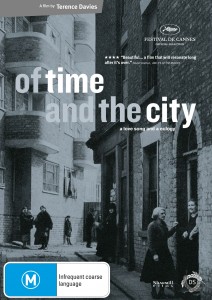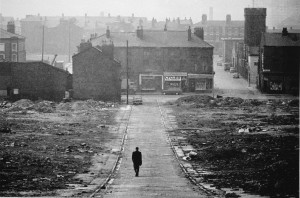Following on from his much loved Distant Voices, Still Lives [1988] and the underrated The House of Mirth [2000], British director Terence Davies returned in 2009 with Of Time and The City. Eschewing a name cast and actorly performances for a dour voice over and library footage, this deeply melancholic and nostalgic essay film is an autobiographical account of the director’s youth in post war Liverpool. Starting off in grainy black and white with flat capped workers, steam trains and well dressed ladies on the town, the film tours through Davies’ recollections of the city, aided and guided by an intriguing selection of sequences drawn from a seemingly vast array of archival material.
As the story progresses and Davies’ plum voice confesses his struggle with his repressed sexuality and his Catholicism, the film shifts to colour as the early 1960s dawn, and then to the Beatles and all that. The narrator is deeply unimpressed by the four mop top “lads” preferring Mahler and poetry to the deeply homophobic era of so-called free love in the latter part of the decade. The Beatles, held in such high regard by the people of Liverpool with statues and re-named streets in their honour, are openly mocked by the acid-tongued Davies who has little time for the surge of youth culture.
As the recent past gives way to the present, Of Time and The City contrasts the faint memory field of the black and white era stock footage for the hard-edged ugliness of digital imagery. Those well-dressed workers and hat wearing gents of 60 years ago are the grandfathers of today’s Liverpudlian yoof – hoodie wearing yobs and girlfriends staggering between nightclubs on freezing night-time streets, the churches of Davies childhood now deconsecrated and converted into posh bars.
Davies’ film isn’t quite the standard old man rant that things weren’t what they used to be when he were a lad. Those antiquated gestures of community such as street parties to celebrate Queen Elizabeth’s coronation play out on screen like a series of personal memories and, no matter how distant a viewer might be from these places and memories, their texture and grain contain something remarkable. Compared with Patrick Keiller’s Robinson In Space [1997] or London [1994], Davies film overflows with emotion, yet like Keiller’s films, Davies traces a physical history of a city through the phantom of shared public memory, something literally evoked in the use of found footage.
Viewers who are neither Northerners nor English are going to miss a lot of the subtleties and nostalgia of the director’s source material, music cues and references in the voice over. Yet, despite these culturally specific reference points, Of Time and the City achieves moments of genuinely effecting emotion.
Of Time and the City
Dir: Terence Davies
Dur: 72 mins
Sahrmill Films/Director’s Suite/Madman



A devastatingly beautiful film. Nostalgia based in bitter reality, it’s a wonderful celebration of the stoic and proud British character in post-war Liverpool. Full of the gritty, harsh reality of the grinding poverty redolent of the rebirth of the country, it’s also a joyous reflection of the simple pleasures of these brave Brits who battled through no matter what. It’s a powerful reminder of the dismal and bleak post-war years, the hypocrisy of the church and social mores and the struggles of Davies who clearly didn’t subscribe to many, if any, of the social rules of the time. Davies’ choice of poetry, philosophical quotes, personal observations and music is truly moving.
But none of these words can do justice to it – you just have to watch it.